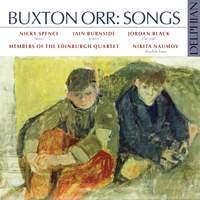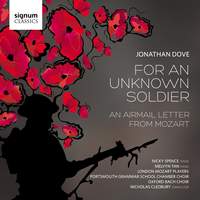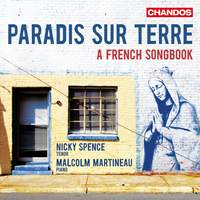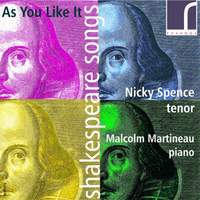Interview,
Nicky Spence on Buxton Orr
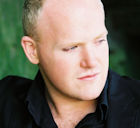 The Scottish tenor Nicky Spence has been making something of a speciality of twentieth-century repertoire of late, both on stage and in the recording studio: just before Christmas I saw him as a compelling, fearlessly sung Alwa in William Kentridge's production of Lulu for English National Opera, Janáček features prominently in his schedule for the current season, and his recent discography has included songs by Vaughan Williams, Britten, Lili Boulanger, Kenneth Leighton and Pavel Haas.
The Scottish tenor Nicky Spence has been making something of a speciality of twentieth-century repertoire of late, both on stage and in the recording studio: just before Christmas I saw him as a compelling, fearlessly sung Alwa in William Kentridge's production of Lulu for English National Opera, Janáček features prominently in his schedule for the current season, and his recent discography has included songs by Vaughan Williams, Britten, Lili Boulanger, Kenneth Leighton and Pavel Haas.
For his latest project (appropriately enough, on the Scottish label Delphian) he's turned his attention to the songs of Glasgow-born Buxton Orr (1924-97), a woefully under-recorded composer who's perhaps better known for his film soundtracks and music for brass and wind bands than for his large body of songs, many of which are infused with his love for his native Scotland and its dialects.
I caught up with Nicky over email last week (just before he headed off to Paris for a run of Berg's Wozzeck at the Opéra Bastille) to find out more about Orr's distinctive voice and the process of bringing these little-known songs to light…
How did Buxton Orr first come onto your radar, and what was it about his music that initially grabbed your attention?
I was due to give a recital all about journeys for a song collective I'm part of called Songsmiths where we came upon 'The Boy on the Train', which is the finale of his Songs of a Childhood set. I was struck by the infectious enthusiasm of the Scots language, which took me back to my childhood in Dumfries. It led me to want to know more about this Buxton Orr.
So little of Orr's music (the songs in particular) has been recorded - why do you think he's fallen by the wayside, and how much research did you have to do to bring the music to light?
I'm not sure if this was a case of Buxton hiding his light under a bushel (Scots can often be backward when it comes to self-promotion!) but on further reading, it's interesting to see how far Orr's music has resonated without the listener even knowing. From his work in film scores to his time at the Guildhall School as composition professor, people still talk very fondly of his presence as a musician and as a thoroughly nice human.
What were the particular pleasures and challenges of recording this music, both in terms of logistics and in terms of the way Orr writes for the voice?
Collating the scores for the instrumental forces involved was quite an uphill struggle. It took a great amount of digging through archives, defunct publishers and emailing to find Buxton's catalogue of work. Once in touch with Buxton's estate and following some lovely correspondence with his widow who was instrumental in commissioning a copyist to make all of Buxton's intentions legible, the rest was relatively free from trouble. All the collaborators involved immediately took to the music and I worked with an Auld Scots expert to bring the text in Canzona to its truthful best, which I think comes off well on the disc.
Several of the reviews of the disc have drawn comparisons with Britten, particularly in the folk-song settings - did you feel any parallels with his music when you were recording these songs, and who do you think were Orr's biggest influences and inspirations when it came to song-writing?
I think such parallels have been made because the music is so effective. Britten is one of the true chiefs of setting text in a way which cuts out any interpretative flim-flam and gets to the heart of the meaning of a song. Much of this is due to the word-setting being close to human speech as we'd hear it delivered in a play, which is something you can tell Buxton admires too. While you can hear glimpses of Vaughan Williams perhaps in the more pastoral moments in 'Canzona', or even Schoenberg at times, there's no denying that Buxton has his own important voice.
How important was 'Scottishness' to Orr, do you think, and how folk-influenced is his writing?
I'd like to think very important. As a Celtic child, so much of our musical and cultural foundation is made up of the great Bard Burns and songs we'd learn on various family members' knee that it undeniably sticks. What I love about any of Buxton's tributes to Scotland is that they never stray into biscuit-tin pastiche, but have a really honest fondness. In the same vein, this is why I was keen to use the Scottish artist Joan Eardley for the artwork of the disc, whose charm comes from the dirtier and more real scenes of Scotland.
'Nicky Spence is the first singer to record a full disc of [Orr's] songs and it’s a revelation...Spence himself sounds terrific throughout – nimble, direct, deftly playful and expressive with the text.' (The Guardian)
Available Formats: CD, MP3, FLAC, Hi-Res FLAC
Recent and related recordings from Nicky Spence
'As always with Dove, the vocal writing is finely gauged. Children’s choirs merge seamlessly into and out of the Oxford Bach Choir, with Nicky Spence a highly eloquent focal-point.' (Gramophone)
Available Formats: CD, MP3, FLAC, Hi-Res FLAC
'[Spence is] a singer near his prime, and already an artist of taste and discrimination...His French is remarkably idiomatic, and he finds colours and chiaroscuro shading in the music, beautifully underlined by Martineau’s playing, that are worthy of a native singer.' (Sunday Times)
Available Formats: CD, MP3, FLAC, Hi-Res FLAC
'Spence’s voice is naturally thrilling, radiant and luminescent in just about every second of this programme, crossing stylistic boundaries with the silvery ease of a born entertainer.' (The Scotsman)
Available Formats: MP3, FLAC


